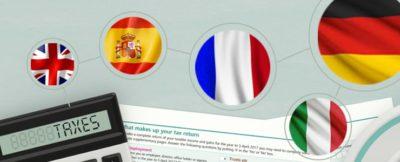Austria is a landlocked country in central Europe with a population of almost 9 million. It is one of the most attractive countries in the world to live in. It is bordered by the Czech Republic and Germany to the north, Hungary and Slovakia to the east, Slovenia and Italy to the south and Switzerland and Liechtenstein to the west.
Austria has a GDP (PPP) per capita of more than US$49,000 in 2018, making it one of the richest countries in the world.
Austria is a member of the EU (including the eurozone and Schengen), the OECD and the WTO. Austria therefore offers the opportunity to become resident in the Schengen territory with minimal bureaucratic requirements.
In the worldwide ranking of cities based on quality of living conducted by the HR consultancy Mercer in 2018, Vienna is in first place, and has consistently been ranked among the top three in the past.
While Austria admittedly has high income tax rates, the fact that no wealth, gift and inheritance taxes are levied is often the reason for high net worth individuals to consider relocating to Austria.
TAX
Income tax
Tax rates and tax basis
An individual’s income is subject to progressive income tax, with the following rate bands applying:
- up to €11,000 0%
- from €11,000, up to €18,000 25%
- from €18,001, up to €31,000 35%
- from €31,001, up to €60,000 42%
- from €60,001, up to €90,000 48%
- from €90,001 50%
Additionally, for the years 2016 to 2020, a maximum tax rate of 55 per cent shall become applicable to income exceeding €1 million. Interest on bank accounts is subject to a flat rate of 25 per cent; interest on bonds, dividends on stocks, capital gains from financial instruments and income from derivatives are subject to a flat rate of 27.5 per cent; and capital gains from real estate are subject to a flat rate of 30 per cent.
Preferential tax regime for persons relocating to Austria
Pursuant to Section 103 of the Austrian Income Tax Act, the Austrian Minister of Finance may eliminate an additional tax burden resulting from an individual’s relocation to Austria, namely for people whose relocation to Austria serves the promotion of science, research, arts or sports and is thus in the public interest (additionally, in the case of scientists and researchers, 30 per cent of their income may be exempted from tax for five years). The Austrian Minister of Finance may prescribe such regulations as may be necessary or appropriate to carry out these provisions. In this respect, a regulation has recently been made available, which deals with certain procedural and substantive issues in connection with the above-mentioned provision.
Wealth tax
Austria does not levy a general wealth tax on all types of personal assets.
Gift and inheritance tax
Austria does not currently levy a gift or inheritance tax. Such taxes were abolished in August 2008.
Bank confidentiality and exchange of information between tax authorities
Bank confidentiality is a highly cherished tradition in Austria and a very emotional topic for the public at large. It was introduced into statutory law in 1979. Although the provisions were originally quite strict, they have in the last few years been progressively loosened, mainly because of pressure from abroad regarding taxation. The starting point for this development was certainly the passing of the EU Savings Directive. In 2009, this was followed by the OECD’s push for facilitating the cross-border exchange of banking information upon request between tax authorities, and in 2014, by the expanded initiative to exchange such information automatically between tax authorities under what is known as the Common Reporting Standard. Finally, in 2015, as a direct result of the concessions made in an international context by granting foreign tax authorities access to Austrian banking information, the scope of Austrian bank confidentiality in a purely domestic tax context was dramatically eroded. Today, bank confidentiality in Austria pales in comparison with former times.
CONCLUSIONS & OUTLOOK
Austria, as a wealthy and sophisticated jurisdiction with a stable political system in the centre of the EU, remains a strong candidate for attracting high net worth individuals in the years to come. If you are looking for a jurisdiction where to relocate, which combines economic and political stability, a clean and safe environment and an excellent infrastructure, and which also offers various tax advantages, please do not hesitate to contact us.
Get a free assesment
Our team of best tax and legal experts, lawyers, accountants and financial advisors answer your question and assist you in achieving your goals




